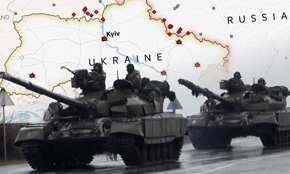
The Russian invasion of Ukraine is causing short-term turbulence
but the markets’ long-term outlook remains unchanged.
--
Vladimir Putin’s decision to invade Ukraine caught the world surprised.
While major stock markets are tumbling, safe-haven securities such as commodities, gold, and U.S. Treasury debt are rising amidst severe inflation.
Clearly, the Western world is facing its most severe crisis since WWII.
Should investors panic? How will the Russian invasion of Ukraine impact the equity markets?
Here is a 6-point breakdown of how the situation will affect the markets and how you should react.
Unfortunately, regional conflicts and wars are natural occurrences. Since 1990, there have been more than 75 armed conflicts worldwide.
The global community is always shocked when a new conflict breaks out. As expected, markets dropped sharply when Russian President Vladimir Putin announced that he was launching a full-scale invasion of Ukraine.
However, Putin didn’t anticipate such swift and coordinated international condemnation of his brutal invasion. So far, markets are responding relatively well to the economic sanctions, and major indices are trying to rally. All they want is an indication that the conflict will resolve peacefully.
Until then, uncertainty and volatility will continue to drive short-term momentum. However, history suggests that this fear will be short-lived. In fact, markets often trend upward despite escalating conflicts.
Undoubtedly, events in Ukraine are alarming and will negatively impact investor sentiment in the short term. However, hopefully, peace will be restored over time, and the post-pandemic recovery can take centre stage again.
The West’s strict sanctions against Russia are having a profound effect on commodity prices. Russia is one of the world’s leading oil and gas producers, and restricting access to their products is straining global supply chains.
At writing, oil prices hover around $110, the highest level since 2014, and the upward trend is not showing any signs of slowing down. Some analysts claim oil prices could hit $130 in the coming weeks.
But oil is not the only commodity whose price is surging:
Tin prices are up 87% YOY.
If the conflict persists and sanctions become permanent, investors should seriously consider investing in commodities to take advantage of ever-surging prices.
While the Russia-Ukraine conflict justifies immediate concern, investors are actually paying more attention to the Federal Reserve’s announcements regarding the expected tightening of its monetary policy.
If interest rates increase, inflation may cool as supply chains normalize, consumer demand returns to pre-pandemic levels, and oil prices ease.
This week, Federal Reserve Chair Jerome Powell proposed a 25 basis point interest rate increase, and bond yields are beginning to rally.
What will interest rate increases mean going forward?
If all goes well, the markets should rally. The very modest rate increase is reassuring investors that the Fed is careful to avoid sparking a recession. The progressive pace of rate hikes will allow economic agents to prepare accordingly.
Despite the doom and gloom, economic fundamentals and corporate earnings remain healthy. Regardless of where we are in the market cycle, it’s important to take a disciplined approach to invest and stay focused on your long-term financial goals.
That said, it appears the two previous years’ euphoria is wearing off. Speculative tech stocks’ prices have dropped sharply, and commodities, such as oil, coal and wheat, are skyrocketing.
With bond yields rising, investors are unwilling to take on excessive risks.
For now, the rotation into value appears sensible. Investors should focus on solid equities with proven cash flows and growth prospects, dividend-paying securities that will benefit from inflationary trends and short-duration bond funds with the potential to deliver modest but safe returns.
Investors should steer clear of Russian assets for the time being.
The ruble has hit 30-year lows, Russian ETFs hit record lows and continue to plunge, and major Russian stocks such as Rosneft, Gazprom and Sberbank are down 40%+ from their recent highs.
Will they recover? Possibly, but at present, the risks far outweigh the potential rewards.
Analysts recommend that investors maintain a diversified mix of asset classes in their portfolio to maximize potential returns and minimize risk. Regularly reviewing and rebalancing your portfolio also helps you remain on track.
We must remember that this is a regional conflict between two nations that have little impact on global financial markets. Yes, the price of oil will shoot up drastically, but very few funds have meaningful exposure to Russian assets.
In fact, once the situation settles, markets will turn their focus to macroeconomic issues of greater importance, such as post-pandemic economic growth, rising inflation and interest rate hikes.
The information in this article is well-researched and factual. Still, it contains opinions also, and IT IS NOT FINANCIAL ADVICE and should not be interpreted as such, do not make any financial decisions based on the information in this article; we are not financial advisors. We are journalists. You should always consult with a professional before making any investment decisions.
© 2022 Market News 4U | All Rights Reserved.
Privacy Policy | Terms & Conditions
alert@marketnews4u.com | +353 (0) 1443 3250